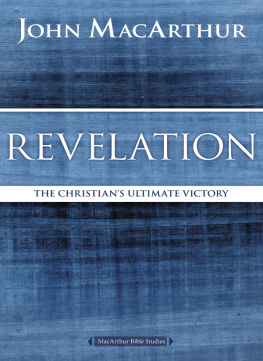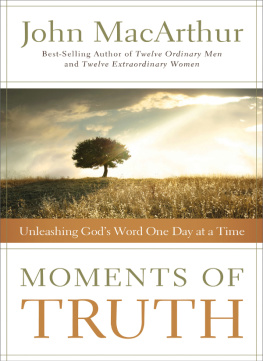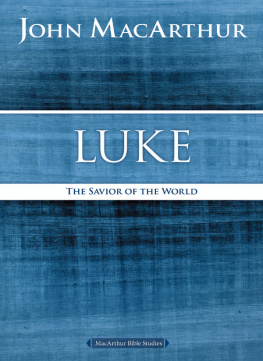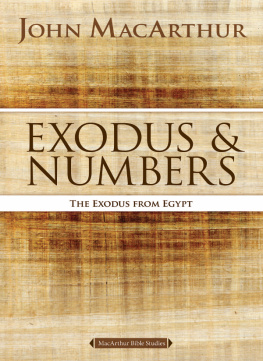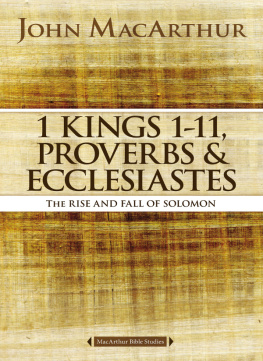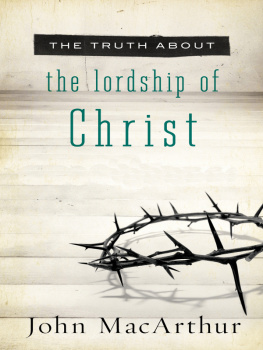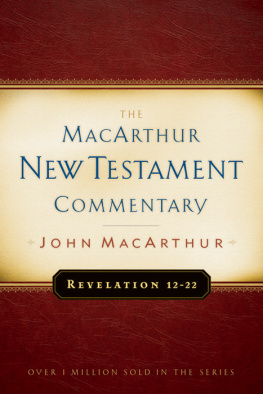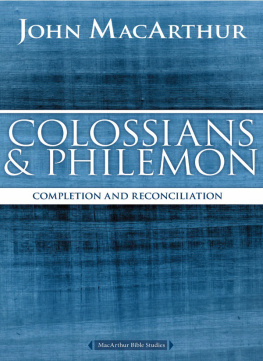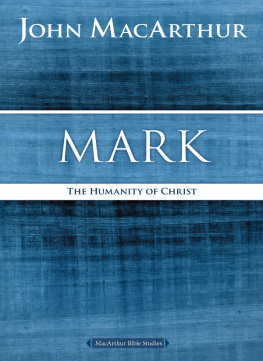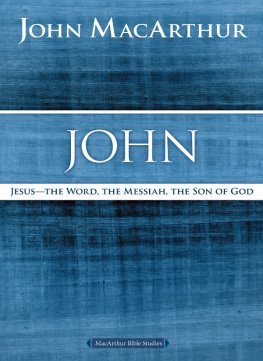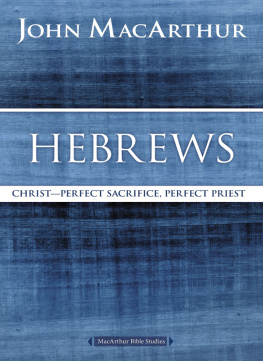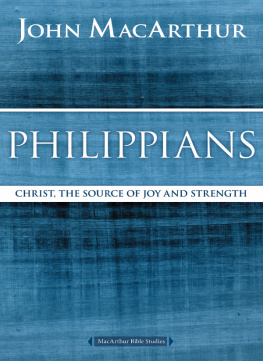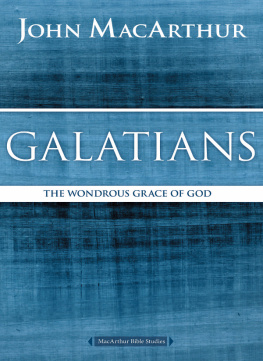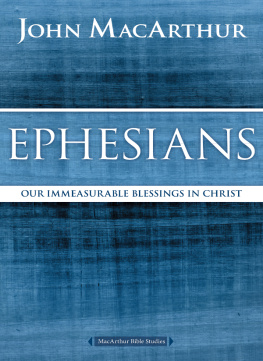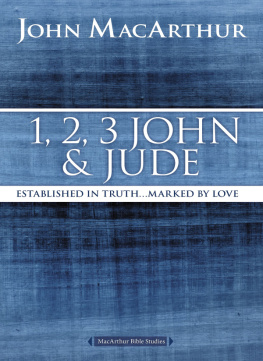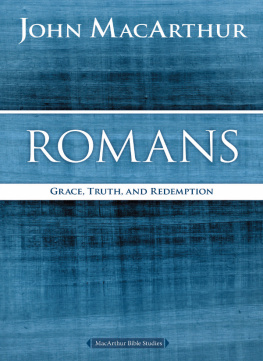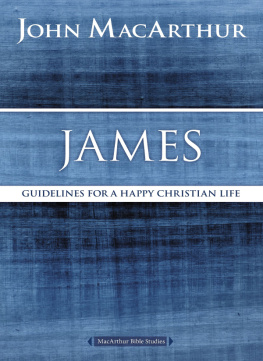
REVELATION
MACARTHUR BIBLE STUDIES
2007, John MacArthur
All rights reserved. No portion of this book may be reproduced, stored in a retrieval system, or transmitted in any form or by any meanselectronic, mechanical, photocopy, recording, scanning, or otherexcept for brief quotations in critical reviews or articles, without the prior written permission of the publisher.
Published in Nashville, Tennessee, by Nelson Books, an imprint of Thomas Nelson. Nelson Books and Thomas Nelson are registered trademarks of HarperCollins Christian Publishing, Inc.
Nelson Books titles may be purchased in bulk for education, business, fundraising, or sales promotional use. For information, please email SpecialMarkets@ThomasNelson.com.
Produced with the assistance of the Livingstone Corporation. Project staff include Jake Barton, Betsy Todt Schmitt, and Andy Culbertson. Project editors: Mary Horner Collins, Amber Rae, and Len Woods.
Scripture quotations marked NKJV are taken from The Holy Bible, New King James Version. 1979, 1980, 1982, 1992 Thomas Nelson, Inc. Publishers.
Unleashing Gods Truth, One Verse at a Time is a trademark of Grace to You. All rights reserved.
Keys to the Text material taken from the following sources:
The MacArthur Study Bible (electronic ed.). John MacArthur, General Editor. 1997 by Word Publishing. All rights reserved. Used by permission.
Cover Art by Holly Sharp Design
Interior Design and Composition by Joel Bartlett, Livingstone Corporation
ISBN 978-0-7180-3519-8
ISBN 978-0-7180-3538-9 (eBook)
First Printing April 2016
In this ebook edition, please use your devices note-taking function to record your thoughts wherever you see the bracketed instructions [Your Notes] or [Your Response Here]. Use your devices highlighting function to record your response whenever you are asked to checkmark, circle, underline, or otherwise indicate your answer(s).
CONTENTS
Unlike most books of the Bible, this one contains its own title: The Revelation of Jesus Christ (1:1). This revelation was given to Him by God the Father, and it was communicated to the apostle John by an angel (1:1).
AUTHOR AND DATE
Four times the author identifies himself as John (1:1, 4, 9; 22:8). Early tradition unanimously identified him as John the apostle, author of the fourth Gospel and three Epistles. For example, important second-century witnesses to the apostle Johns authorship include Justin Martyr, Irenaeus, Clement of Alexandria, and Tertullian. Many of the books original readers were still alive during the lifetimes of Justin Martyr and Irenaeusboth of whom held to apostolic authorship.
There are differences in style between Revelation and Johns other writings, but they are insignificant and do not preclude one man from writing both. In fact, there are some striking parallels between Revelation and Johns other works. Only Johns Gospel and Revelation refer to Jesus Christ as the Word (19:13; John 1:2). Revelation (1:7) and Johns Gospel (19:37) translate Zechariah 12:10 differently from the Septuagint, but in agreement with each other. Only Revelation and the Gospel of John describe Jesus as the Lamb (5:6, 8; John 1:29); both describe Jesus as a witness (see 1:5; John 5:3132).
Revelation was written in the last decade of the first century (about AD 9496), near the end of Emperor Domitians reign (AD 8196). Although some date it during Neros reign (AD 5468), their arguments are unconvincing and conflict with the view of the early church. Writing in the second century, Irenaeus declared that Revelation had been written toward the end of Domitians reign. Later writers, such as Clement of Alexandria, Origen, Victorinus (who wrote one of the earliest commentaries on Revelation), Eusebius, and Jerome affirm the Domitian date.
The spiritual decline of the seven churches (chs. 2 and 3) also argues for the later date. Those churches were strong and spiritually healthy in the mid-60s, when Paul last ministered in Asia Minor. The brief time between Pauls ministry there and the end of Neros reign was too short for such a decline to have occurred. The longer time gap also explains the rise of the heretical sect known as the Nicolaitans (2:6, 15), who are not mentioned in Pauls letters, not even to one or more of these same churches (Ephesians). Finally, dating Revelation during Neros reign does not allow time for Johns ministry in Asia Minor to reach the point at which the authorities would have felt the need to exile him.
BACKGROUND AND SETTING
Revelation begins with John, the last surviving apostle and an old man, in exile on the small, barren island of Patmos, located in the Aegean Sea southwest of Ephesus. The Roman authorities had banished him there because of his faithful preaching of the gospel (1:9). While on Patmos, John received a series of visions that laid out the future history of the world.
When he was arrested, John was in Ephesus, ministering to the church there and in the surrounding cities. Seeking to strengthen those congregations that he could no longer minister to in person, and following the divine command (1:11), John addressed Revelation to them (1:4). The churches had begun to feel the effects of persecution; at least one manprobably a pastorhad already been martyred (2:13), and John himself had been exiled. But the storm of persecution was about to break in full fury upon the seven churches so dear to the apostles heart (2:10). To those churches, Revelation provided a message of hope: God is in sovereign control of all the events of human history, and though evil often seems pervasive and wicked men all-powerful, their ultimate doom is certain. Christ will come in glory to judge and rule.
HISTORICAL AND THEOLOGICAL THEMES
Since it is primarily prophetic, Revelation contains little historical material, other than that in chapters 13. The seven churches to whom the letter was addressed were existing churches in Asia Minor (modern Turkey). Apparently, they were singled out because John had ministered in them.
Revelation is first and foremost a revelation about Jesus Christ (1:1). The book depicts Him as the risen, glorified Son of God ministering among the churches (1:1020), as the faithful witness, the firstborn from the dead, and the ruler over the kings of the earth (1:5), as the Alpha and the Omega, the Beginning and the End (1:8), as the One who is and who was and who is to come, the Almighty (1:8), as the First and the Last (1:11), as the Son of Man (1:13), as the One who was dead, but now is alive forevermore (1:18), as the Son of God (2:18), as the One who is holy and true (3:7), as the Amen, the Faithful and True Witness, the Beginning of the creation of God (3:14), as the Lion of the tribe of Judah (5:5), as the Lamb in heaven, with authority to open the title deed to the earth (6:18:1), as the Lamb on the throne (7:17), as the Messiah who will reign forever (11:15), as the Word of God (19:13), as the majestic King of kings and Lord of lords, returning in glorious splendor to conquer His foes (19:1121), and as the Root and the Offspring of David, the Bright and Morning Star (22:16).
Many other rich theological themes find expression in Revelation. The church is warned about sin and exhorted to holiness. Johns vivid pictures of worship in heaven both exhort and instruct believers. In few other books of the Bible is the ministry of angels so prominent. Revelations primary theological contribution is to eschatology, that is, the doctrine of last things. In it we learn about the final political setup of the world; the last battle of human history; the career and ultimate defeat of Antichrist; Christs thousand-year earthly kingdom; the glories of heaven and the eternal state; and the final state of the wicked and the righteous. Finally, only Daniel rivals this book in declaring that God providentially rules over the kingdoms of men and will accomplish His sovereign purposes regardless of human or demonic opposition.
Next page
